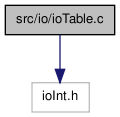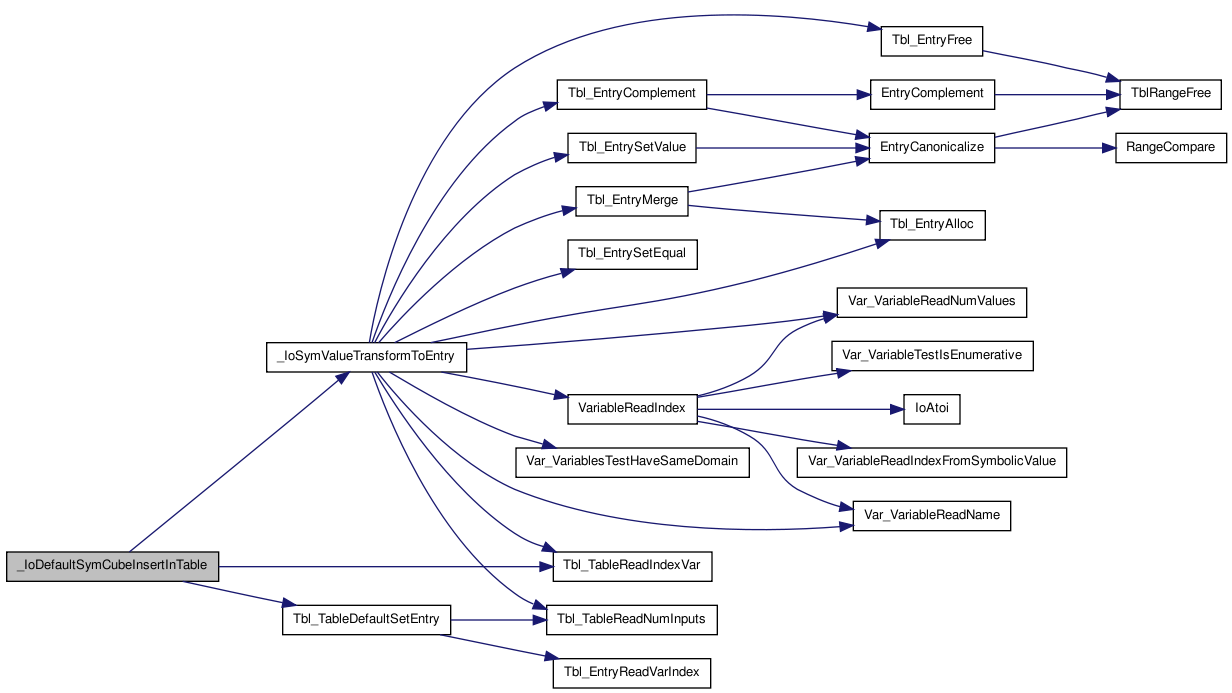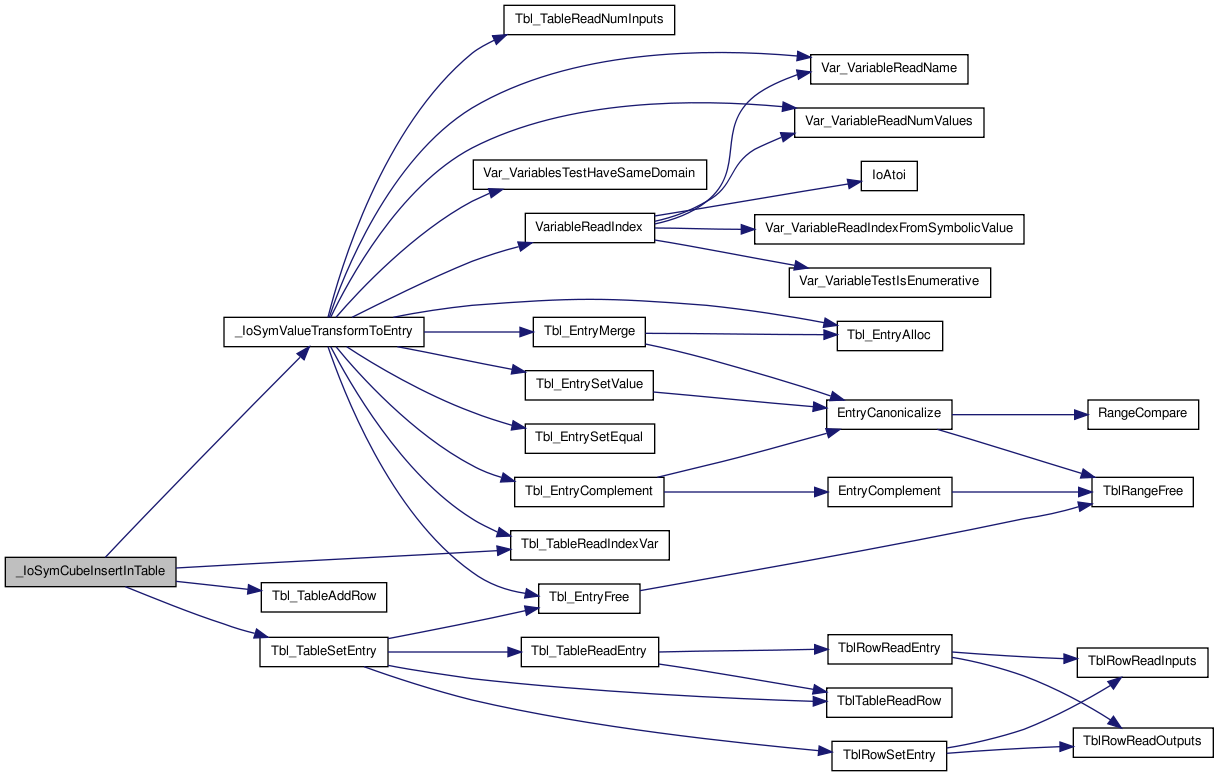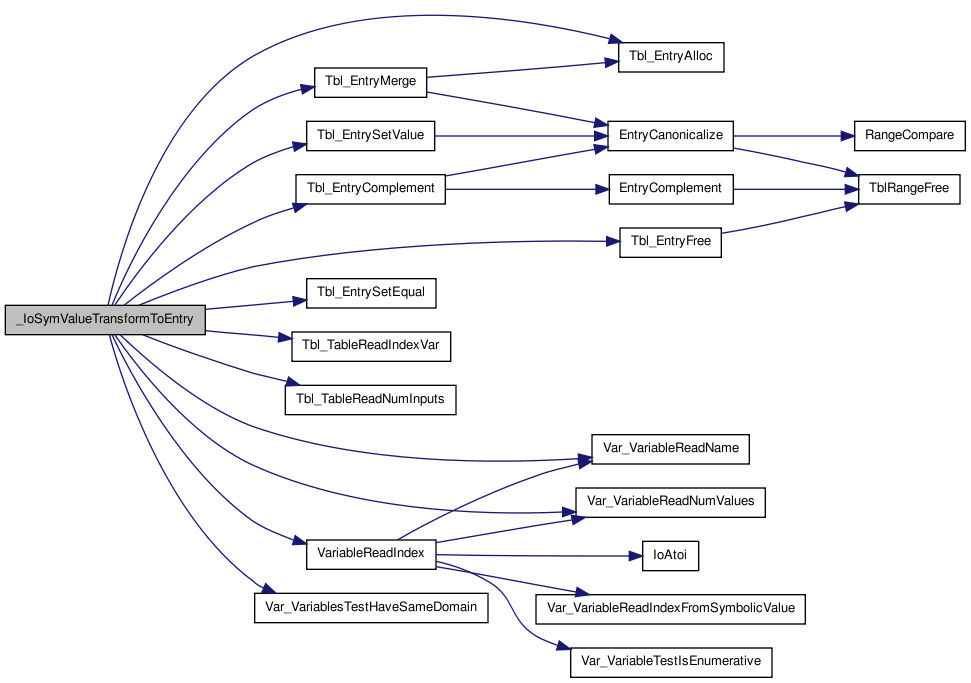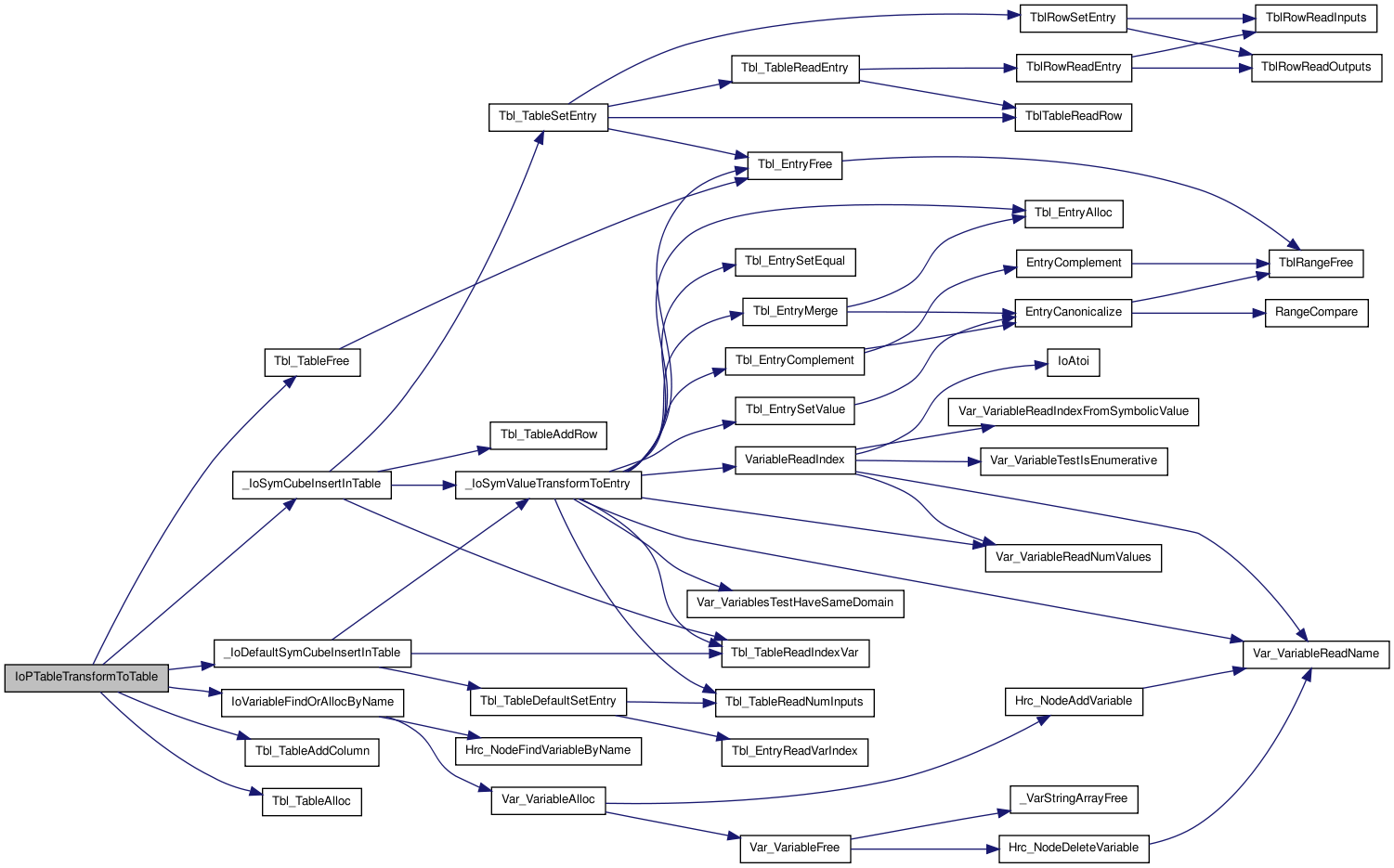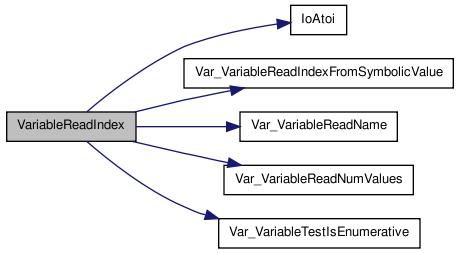#include "ioInt.h" Include dependency graph for ioTable.c:
Include dependency graph for ioTable.c:Go to the source code of this file.
Functions | |
| static void | _IoSymValueFree (IoSymValue_t *value) |
| static int | _IoSymCubeInsertInTable (Tbl_Table_t *table, array_t *symCube, int numIp, int numOp) |
| static int | _IoDefaultSymCubeInsertInTable (Tbl_Table_t *table, array_t *symCube, int numOp) |
| static Tbl_Entry_t * | _IoSymValueTransformToEntry (IoSymValue_t *value, Var_Variable_t *var, Tbl_Table_t *table) |
| static int | VariableReadIndex (Var_Variable_t *var, char *value) |
| Tbl_Table_t * | IoPTableTransformToTable (Hrc_Model_t *model, Hrc_Node_t *hnode, IoPTable_t *pTable) |
| IoSymValue_t * | IoSymValueAlloc (void) |
| void | IoSymValueArrayFree (array_t *valueArray) |
Variables | |
| static char rcsid[] | UNUSED = "$Id: ioTable.c,v 1.8 2002/09/08 23:40:00 fabio Exp $" |
Function Documentation
| static int _IoDefaultSymCubeInsertInTable | ( | Tbl_Table_t * | table, |
| array_t * | symCube, | ||
| int | numOp | ||
| ) | [static] |
Function********************************************************************
Synopsis [Given a default symbolic cube in textual format and a table, updates the table by adding the cube.]
Description []
SideEffects [The default cube is added to the table.]
SeeAlso []
Definition at line 348 of file ioTable.c.
{
int i;
IoSymValue_t *symValue;
Tbl_Entry_t *entry;
/* no defaults is asserted. */
if (symCube == NIL(array_t)){
return 1;
}
for (i=0; i < array_n(symCube); i++){
symValue = array_fetch(IoSymValue_t *,symCube, i);
entry = _IoSymValueTransformToEntry(symValue,Tbl_TableReadIndexVar(table,i,1),table);
if (entry == NIL(Tbl_Entry_t))
return 0;
Tbl_TableDefaultSetEntry(table,entry,i);
}
return 1;
}
 Here is the call graph for this function:
Here is the call graph for this function: Here is the caller graph for this function:
Here is the caller graph for this function:| static int _IoSymCubeInsertInTable | ( | Tbl_Table_t * | table, |
| array_t * | symCube, | ||
| int | numIp, | ||
| int | numOp | ||
| ) | [static] |
Function********************************************************************
Synopsis [Given a symbolic cube in textual format and a table, updates the table by adding the cube.]
Description [Given a symbolic cube in textual format and a table, updates the table by adding the cube. The arguments are a pointer to the working table, a cube to be inserted in textual format, the number of inputs of the table, and the number of outputs of the table.]
SideEffects [The new cube represented in symCube is inserted in the table.]
SeeAlso []
Definition at line 304 of file ioTable.c.
{
int index, i;
IoSymValue_t *symValue;
Tbl_Entry_t *entry;
/* get a new row for the cube */
index = Tbl_TableAddRow(table);
for (i=0; i < numIp; i++){
symValue = array_fetch(IoSymValue_t *,symCube,i);
entry = _IoSymValueTransformToEntry(symValue,Tbl_TableReadIndexVar(table,i,0),table);
if (entry == NIL(Tbl_Entry_t))
return 0;
Tbl_TableSetEntry(table,entry,index,i,0);
}
for (i=0; i < numOp; i++){
symValue = array_fetch(IoSymValue_t *,symCube, numIp+i);
entry = _IoSymValueTransformToEntry(symValue,Tbl_TableReadIndexVar(table,i,1),table);
if (entry == NIL(Tbl_Entry_t))
return 0;
Tbl_TableSetEntry(table,entry,index,i,1);
}
return 1;
}
 Here is the call graph for this function:
Here is the call graph for this function: Here is the caller graph for this function:
Here is the caller graph for this function:| static void _IoSymValueFree | ( | IoSymValue_t * | value | ) | [static] |
AutomaticStart
Function********************************************************************
Synopsis [Frees the IoSymValue_t data structure.]
Description []
SideEffects []
SeeAlso []
Definition at line 257 of file ioTable.c.
{
IoSymValueType flag;
/* if flag == IoUniverse_c, we have no extra work to do */
if ((flag = value->flag) == IoLeaf_c ){
FREE(value->left);
}
if (flag == IoRange_c){
FREE(value->left);
FREE(value->right);
}
if (flag == IoComplement_c){
_IoSymValueFree(value->left);
}
if (flag == IoList_c){
int i;
IoSymValue_t *valueTmp;
for (i=0; i < array_n(value->elements); i++){
valueTmp = array_fetch(IoSymValue_t *,value->elements,i);
_IoSymValueFree(valueTmp);
}
array_free(value->elements);
}
if (flag == IoAssign_c){
FREE(value->left);
}
FREE(value);
}
 Here is the caller graph for this function:
Here is the caller graph for this function:| static Tbl_Entry_t * _IoSymValueTransformToEntry | ( | IoSymValue_t * | value, |
| Var_Variable_t * | var, | ||
| Tbl_Table_t * | table | ||
| ) | [static] |
Function********************************************************************
Synopsis [Generates a set of ranges used in the table data structure from textual representation of symbolic values.]
Description [Generates a set of ranges used in the table data structure from textual representation of symbolic values. Symbolic values are representations which can be put into an entry of a table, i.e. a symbolic element in a row. The arguments of the function are a symbolic value in IoSymValue_t *, a pointer to the corresponding variable, and the table we are working on. The last argument is needed to resolve = constructs.]
SideEffects []
SeeAlso []
Definition at line 392 of file ioTable.c.
{
IoSymValueType flag;
Tbl_Entry_t *entry;
if ((flag = value->flag) == IoLeaf_c){
int index;
index = VariableReadIndex(var,(char *)(value->left));
if (index == -1){
return NIL(Tbl_Entry_t);
}
entry = Tbl_EntryAlloc(Tbl_EntryNormal_c);
Tbl_EntrySetValue(entry,index,index);
return entry;
}
if (flag == IoUniverse_c){
int range;
range = Var_VariableReadNumValues(var);
entry = Tbl_EntryAlloc(Tbl_EntryNormal_c);
Tbl_EntrySetValue(entry,0,range-1);
return entry;
}
if (flag == IoRange_c){
int indexFrom, indexTo;
indexFrom = VariableReadIndex(var,(char *)(value->left));
indexTo = VariableReadIndex(var,(char *)(value->right));
if (indexFrom == -1 || indexTo == -1){
return NIL(Tbl_Entry_t);
}
entry = Tbl_EntryAlloc(Tbl_EntryNormal_c);
Tbl_EntrySetValue(entry,indexFrom,indexTo);
return entry;
}
if (flag == IoComplement_c){
entry = _IoSymValueTransformToEntry(value->left,var,table);
if (entry == NIL(Tbl_Entry_t)){
return NIL(Tbl_Entry_t);
}
Tbl_EntryComplement(entry,0,Var_VariableReadNumValues(var)-1);
return entry;
}
if (flag == IoList_c){
int i;
IoSymValue_t *valueTmp;
Tbl_Entry_t *entryTmp, *entryUnion;
entry = Tbl_EntryAlloc(Tbl_EntryNormal_c);
for (i=0; i < array_n(value->elements); i++){
valueTmp = array_fetch(IoSymValue_t *,value->elements,i);
entryTmp = _IoSymValueTransformToEntry(valueTmp,var,table);
if (entryTmp == NIL(Tbl_Entry_t)){
Tbl_EntryFree(entry);
return NIL(Tbl_Entry_t);
}
entryUnion = Tbl_EntryMerge(entry,entryTmp);
Tbl_EntryFree(entry);
Tbl_EntryFree(entryTmp);
entry = entryUnion;
}
return entry;
}
if (flag == IoAssign_c){
int i;
Var_Variable_t *varCandidate = NIL(Var_Variable_t);
entry = Tbl_EntryAlloc(Tbl_EntryEqual_c);
for (i=0; i < Tbl_TableReadNumInputs(table); i++){
varCandidate = Tbl_TableReadIndexVar(table,i,0);
if (strcmp(Var_VariableReadName(varCandidate),(char *)value->left) == 0){
/* found the variable referred in = construct as an input of the table */
break;
}
}
/* the following if-clause is only true when the above for-loop cannot
find the variable referred in = construct */
if (i == Tbl_TableReadNumInputs(table)){
error_append("Variable ");
error_append((char *)value->left);
error_append(" is not an input of the table where ");
error_append(Var_VariableReadName(var));
error_append(" is an output. It cannot be used as an argument of = construct.\n");
Tbl_EntryFree(entry);
return NIL(Tbl_Entry_t);
}
/* check if the two variables connected with = construct have the same domain */
if (Var_VariablesTestHaveSameDomain(var,varCandidate) == 0){
error_append("Variables ");
error_append((char *)value->left);
error_append(" and ");
error_append(Var_VariableReadName(var));
error_append(" have different domains. Cannot be used in = construct.\n");
Tbl_EntryFree(entry);
return NIL(Tbl_Entry_t);
}
Tbl_EntrySetEqual(entry,i);
return entry;
}
else {
return NIL(Tbl_Entry_t);
}
}
 Here is the call graph for this function:
Here is the call graph for this function: Here is the caller graph for this function:
Here is the caller graph for this function:| Tbl_Table_t* IoPTableTransformToTable | ( | Hrc_Model_t * | model, |
| Hrc_Node_t * | hnode, | ||
| IoPTable_t * | pTable | ||
| ) |
AutomaticEnd Function********************************************************************
Synopsis [Transforms table information stored in a special data structure IoPTable_t used by the parser to the table data structure.]
Description [Transforms table information stored in a special data structure IoPTable_t used by the parser to the table data structure. The second and the third arguments and the model and the corresponding master hnode being parsed.]
SideEffects []
SeeAlso []
Definition at line 106 of file ioTable.c.
{
int i, numIo, numIp, numOp;
char *input, *output;
array_t *symCubes, *symCube;
Tbl_Table_t *table;
Var_Variable_t *var;
symCubes = pTable->cubes;
/* if neither symCubes nor default is set, the table is illegal */
if (symCubes == NIL(array_t) && pTable->defaultOutput == NIL(array_t)){
error_append("Error: Table ");
error_append(array_fetch(char *,pTable->outputs,0));
error_append(" has neither relation nor default.\n");
return NIL(Tbl_Table_t);
}
/* partial check to see if symCubes is properly set up */
numIp = array_n(pTable->inputs);
numOp = array_n(pTable->outputs);
numIo = numIp + numOp;
if (symCubes != NIL(array_t)){
for (i=0; i < array_n(symCubes); i++){
symCube = array_fetch(array_t *,symCubes,i);
if (numIo != array_n(symCube)){
error_append("Error: The number of columns in the table where output ");
error_append(array_fetch(char *,pTable->outputs,0));
error_append(" is defined is not equal to the number of input/output variables.\n");
return NIL(Tbl_Table_t);
}
}
}
table = Tbl_TableAlloc();
/* add input columns to the table */
for (i=0; i < array_n(pTable->inputs); i++){
input = array_fetch(char *,pTable->inputs,i);
/* the following if should not fail due to the spec of IoVariableFindOrAllocByName() -- To be fixed */
if ((var = IoVariableFindOrAllocByName(hnode,input)) == NIL(Var_Variable_t)){
return NIL(Tbl_Table_t);
}
/* the following if should not fail due to the spec of Tbl_TableAddColumn() -- To be fixed */
if (Tbl_TableAddColumn(table,var,0) == 0){
return NIL(Tbl_Table_t);
}
}
/* add output columns to the table */
for (i=0; i < array_n(pTable->outputs); i++){
output = array_fetch(char *,pTable->outputs,i);
/* the following if should not fail due to the spec of IoVariableFindOrAllocByName() -- To be fixed */
if ((var = IoVariableFindOrAllocByName(hnode,output)) == NIL(Var_Variable_t)){
return NIL(Tbl_Table_t);
}
/* the following if should not fail due to the spec of Tbl_TableAddColumn() -- To be fixed */
if (Tbl_TableAddColumn(table,var,1) == 0){
return NIL(Tbl_Table_t);
}
}
/* insert a cube one by one to the table */
if (symCubes != NIL(array_t)){
for (i=0; i < array_n(symCubes); i++){
symCube = array_fetch(array_t *,symCubes,i);
if (_IoSymCubeInsertInTable(table, symCube, numIp, numOp) == 0){
Tbl_TableFree(table);
return NIL(Tbl_Table_t);
}
}
}
/* check if the default and the output has the same number of variables */
if (pTable->defaultOutput != NIL(array_t) && array_n(pTable->outputs) != array_n(pTable->defaultOutput)){
error_append("Error: Default is not compatible with the number of outputs in output of ");
error_append(array_fetch(char *,pTable->outputs,0));
error_append("\n");
Tbl_TableFree(table);
return NIL(Tbl_Table_t);
}
/* insert the default cube to the table */
if (_IoDefaultSymCubeInsertInTable(table, pTable->defaultOutput, numOp) == 0) {
Tbl_TableFree(table);
return NIL(Tbl_Table_t);
}
return table;
}
 Here is the call graph for this function:
Here is the call graph for this function: Here is the caller graph for this function:
Here is the caller graph for this function:| IoSymValue_t* IoSymValueAlloc | ( | void | ) |
| void IoSymValueArrayFree | ( | array_t * | valueArray | ) |
Function********************************************************************
Synopsis [Frees an array of the IoSymValue_t data structure.]
Description [Frees an array of the IoSymValue_t data structure. All the elements of the array are also freed.]
SideEffects []
SeeAlso []
Definition at line 230 of file ioTable.c.
{
int i;
for (i=0; i < array_n(valueArray); i++){
_IoSymValueFree(array_fetch(IoSymValue_t *,valueArray,i));
}
array_free(valueArray);
}
 Here is the call graph for this function:
Here is the call graph for this function: Here is the caller graph for this function:
Here is the caller graph for this function:| static int VariableReadIndex | ( | Var_Variable_t * | var, |
| char * | value | ||
| ) | [static] |
Function********************************************************************
Synopsis [Returns the integer index given a value.]
Description [Returns the integer index given a value. The value is either an integer or a symbolic name. If the latter is the case, it is transformed into the corresponding integer. If a given symbolic name is not valid, the routine returns -1.]
SideEffects []
SeeAlso []
Definition at line 515 of file ioTable.c.
{
int integer;
if (Var_VariableTestIsEnumerative(var) == 1){
integer = IoAtoi(value);
if (integer == -1 || integer >= Var_VariableReadNumValues(var)){
error_append("Value ");
error_append(value);
error_append(" is not a proper value for variable ");
error_append(Var_VariableReadName(var));
error_append("\n");
return -1;
}
return integer;
}
/* var is now a symbolic variable */
if ((integer = Var_VariableReadIndexFromSymbolicValue(var,value)) == -1){
error_append("Value ");
error_append(value);
error_append(" is not a proper value for variable ");
error_append(Var_VariableReadName(var));
error_append("\n");
return -1;
}
return integer;
}
 Here is the call graph for this function:
Here is the call graph for this function: Here is the caller graph for this function:
Here is the caller graph for this function:Variable Documentation
char rcsid [] UNUSED = "$Id: ioTable.c,v 1.8 2002/09/08 23:40:00 fabio Exp $" [static] |
CFile***********************************************************************
FileName [ioTable.c]
PackageName [io]
Synopsis [Routines for generating the table data structure from textual information. Used in the parser.]
Description []
SeeAlso []
Author [Yuji Kukimoto, Rajeev Ranjan, Huey-Yih Wang]
Copyright [Copyright (c) 1994-1996 The Regents of the Univ. of California. All rights reserved.
Permission is hereby granted, without written agreement and without license or royalty fees, to use, copy, modify, and distribute this software and its documentation for any purpose, provided that the above copyright notice and the following two paragraphs appear in all copies of this software.
IN NO EVENT SHALL THE UNIVERSITY OF CALIFORNIA BE LIABLE TO ANY PARTY FOR DIRECT, INDIRECT, SPECIAL, INCIDENTAL, OR CONSEQUENTIAL DAMAGES ARISING OUT OF THE USE OF THIS SOFTWARE AND ITS DOCUMENTATION, EVEN IF THE UNIVERSITY OF CALIFORNIA HAS BEEN ADVISED OF THE POSSIBILITY OF SUCH DAMAGE.
THE UNIVERSITY OF CALIFORNIA SPECIFICALLY DISCLAIMS ANY WARRANTIES, INCLUDING, BUT NOT LIMITED TO, THE IMPLIED WARRANTIES OF MERCHANTABILITY AND FITNESS FOR A PARTICULAR PURPOSE. THE SOFTWARE PROVIDED HEREUNDER IS ON AN "AS IS" BASIS, AND THE UNIVERSITY OF CALIFORNIA HAS NO OBLIGATION TO PROVIDE MAINTENANCE, SUPPORT, UPDATES, ENHANCEMENTS, OR MODIFICATIONS.]
